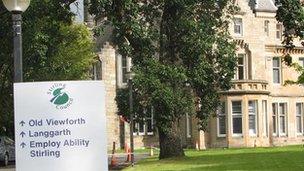'Hundreds more' Scottish council jobs to go
- Published

All of Scotland's 32 councils have faced cuts to their budgets in recent years
Hundreds more council jobs are set to be cut in the next few years, according to BBC Scotland research.
Several Scottish councils said they have to find millions of pounds worth of cuts and savings on top of those they have already made.
Scotland's largest council, Glasgow, expects to have to save £71m in the next two years but has no target number for job cuts.
East Dunbartonshire hopes to cut its payroll by 250 over the next 18 months.
The survey of councils by BBC Scotland suggested many more hard budget decisions on jobs and local services lie ahead over the next few years.
Local authorities were asked how staff numbers had changed over the past year, whether they expected to cut more staff and what budget savings they anticipated.
Seventeen of Scotland's 32 authorities had replied to the questions by Monday.
Natural wastage
In the past year, Glasgow has cut its headcount by 256, Shetland by 112, East Dunbartonshire by 100 and Scottish Borders by 88.
North Ayrshire said it expected to cut a further 317 jobs by 2015-16, while East Dunbartonshire said it expected to cut 250 by April 2015.
Fife expects to make £100m worth of cuts over the next four years.
Falkirk plans to make savings of another £35m over the next three years, Shetland another £10m by 2016-17, South Lanarkshire £51m by 2016-17, East Ayrshire £37m by 2016-17 and West Lothian £34m by 2017-18.
The overwhelming majority of the job cuts so far have come about through voluntary redundancy and early retirement programmes or through natural wastage.
Councils said they hoped to continue to be able to cut jobs without resorting to compulsory redundancies.
However a number have had to make some staff compulsorily redundant.
The broad financial picture across Scottish local government is similar, although the exact situation varies from authority to authority.
Most expect the need to find significant savings to continue for several more years.
There are a number of reasons for this.
Overall public spending is expected to remain tight while the UK government - which provides the Scottish government's budget - continues to try to reduce the UK budget deficit.
Because of this, it is thought unlikely the Scottish government - which provides about 80% of a typical council's budget - will be able to give local authorities any more money in real terms than it does at the moment.
Council tax freeze
Meanwhile the Scottish government's council tax freeze is due to continue until 2016. The terms of the freeze mean a council would need to raise the council tax substantially before it would make a significant difference to their budget.
Against all this, the demand for some council services is forecast to continue rising unavoidably - for instance as the population ages - meaning the money has to be found somewhere else.

There is an ongoing dispute at Stirling Council
Broadly speaking, councils have been making the savings in two distinct ways - straightforward cuts to local services, for instance closing facilities or reducing their opening hours, and efficiency savings in which the same headline service is provided but with fewer staff or a smaller budget.
Many councils have tried to avoid headline-grabbing cuts to local services while others have taken what they acknowledge were hard decisions in the face of local opposition.
Public sector union Unison argues some councils are attempting to achieve their cuts by so-called salami slicing - in other words making cuts to staff, budgets or services which the public may not immediately notice - while others are being more transparent about the need for service cuts.
The union's Dave Watson said: "The difference is between authorities who are trying to get by with a bit more salami slicing and others who are saying we have to decide what we are no longer going to do."
Local opposition
The union calculates 34,500 jobs have gone in Scottish local government in recent years.
Speaking on the BBC's Good Morning Scotland programme, Dougie Black from Unison said the union was working hard in councils across the country minimise job losses and protect local services.
However, he said he believed the council tax freeze was no longer sustainable.
"The Scottish government has got a difficult budget to manage in the circumstances," he said.
"But, as in all walks of life, choices have to be made and at this moment in time local authorities are clearly the losers.
"Local authorities need to be able to raise more finance themselves in order to be a bit more innovative about how services can be provided."
Local Government Minister Derek Mackay said the Scottish government had tried to protect local government "as best we can".
And he insisted the council tax freeze had helped many people: "If you are in a lower band house and you have a lower income, then as proportion of your income or your earnings that council tax freeze has been a great relief.
"The worst of all worlds is happening south of the border where people are seeing their services damaged, their council budgets cut and their council tax going up. That doesn't feel particularly fair."
One of the most controversial plans for cuts at present is in Moray where the council intends to shut seven rural libraries. On Saturday, hundreds of people joined a protest in Elgin against the move. Moray is trying to save £24m in the next few months.
The biggest single cost which councils can control is their wage bill. This year staff were offered a 1% pay rise after a two-year wage freeze, although many did receive incremental pay rises as they progressed in their jobs.
In Stirling, an industrial dispute continues. It has centred on the council's plan for a 0.5% pay cut and an additional hour of work per week.
Councils are under a legal obligation to balance their budgets. While different councils anticipate different levels of cuts and savings in the next few years, it is clear the austerity will continue for some time.
- Published14 October 2013
- Published9 October 2013
- Published14 August 2013